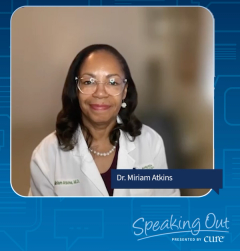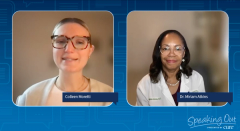
Debunking Myths of Clinical Trials for Cancer
As a part of its “Speaking Out” video series, CURE® spoke with Dr. Miriam Atkins, on behalf of the Community Oncology Alliance, about clinical trials in cancer care.
Transcription:
Colleen Moretti: What are some common challenges that we're seeing in clinical trials right now?
Dr. Miriam Atkins: The most common challenge I would believe are some patients feel like they're being experimented on with clinical trials. And we have to explain to them: I know this is a long history of sometimes patients don't trust this, but I try to tell them for a cancer patient a clinical trial will not be treatment versus a placebo, unless the patient has failed all other options, because that's just not acceptable. If you have cancer, we want to treat, we're not going to give you a placebo. We may give you a standard medicine plus placebo versus a standard medication and this new medication we're trying to see works better. So that's one myth we want to dispel about clinical trials.
We also want to dispel the myth that you can only get a clinical trial at a major center, like MD Anderson or Memorial Sloan Kettering, or those places. We have clinical trials in the local area and your local clinical oncology office, which is going to be more convenient for the patient and less expensive because the patient won't have travel expenses.
Moretti: What are some disparities that we see in clinical trials? And what do we need to do to close those gaps?
Atkins: Unfortunately, there is not good representation across the races and ages and even sexes for clinical trials. I think the way to fix that disparity is more education to let patients know about clinical trials, let patients know they can look for clinical trials. I tell patients I have 1000s of patients, but that patient has one patient — them. So I tell them, look around, I give them resources to look for clinical trials, then bring the information to me and I will help go through it with you.
Moretti: There are a lot of clinical trials out there which can be overwhelming for patients to understand. How can patients understand that better? And are there any resources at Community Oncology alliance to help them?
Atkins: Well at Community Oncology Alliance we don't have clinical trials per se. However, when you call the CPAN network, they can direct you and vet some of the trials for you and tell you things like “This foundation, this company has trials for prostate cancer. This company has trials for breast cancer,” they can kind of guide you and direct you in that manner. There's also the main website clinicaltrials.gov, which anyone can log on and you type in your diagnosis, your stage and where you live. It will list the trials and it will also say what trials are open and what trials are closed, and what trials are still looking for patients. So, there are many resources out there to find out about clinical trials.
Moretti: What are some common myths about clinical trials that patients have that you'd like to debunk here?
Atkins: The main number one myth is you can have a clinical trial at your local community cancer center. You don't have to go to a major place out of town or out of state for a clinical trial. That's the number one thing I'm myth I like to debunk.
The other one is you're not going to be a guinea pig. You'll get great care in a clinical trial. I try to tell my patients that every drug we use right now, the standard of care, started out in a clinical trial, started out as a number and then a name and then they figured out how it works.
I'll give one example. I've been doing oncology for quite some time, and I remember when Herceptin (trastuzumab) was in a clinical trial and then it was approved for stage four breast cancer, and it works so well now we use it in early stages. And so, with that we have better cures, better quality of life and longer life expectancy with breast cancer that used to be a death sentence. So, every drug we have started out in a clinical trial. So, I try to tell them don't be afraid because these things help you and help future cancer patients.
This transcription has been edited for clarity.






